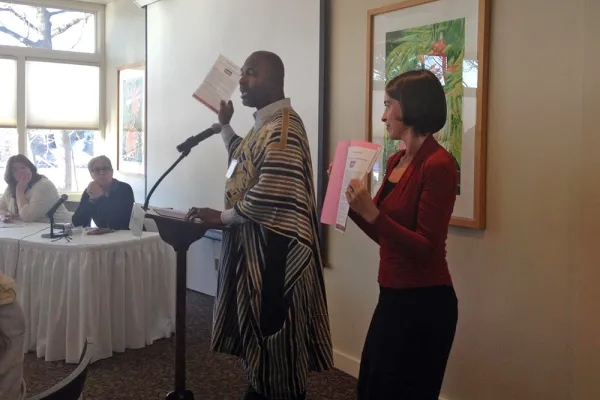Building Bridges: Conference Highlights Issues Facing Refugees, Immigrants
Research & Inquiry

Published January 30, 2015
Radha Adhikari summed up in one word what it felt like to arrive in the United States after 18 years of living in a refugee camp in Nepal: “Overwhelming.”
After fleeing religious persecution in her native Bhutan, Adhikari completed a law degree in neighboring Nepal. But after arriving in California in 2010, she was unable to find a job in her chosen field. Instead, she traveled two hours by bus each day to work in a Cinnabon store in a mall near San Diego, where she was first resettled.
Although Adhikari was educated and spoke English, she said it still took a while to acquire the documents needed for that first job.
The situation is even harder for refugees with fewer language skills, she told an audience at a Smith conference last week. “Most are thrown into this environment where everyone speaks English, and they do not get enough help,” Adhikari said.
Her experiences inspired Adhikari—who has since earned a master’s degree and now works as a therapist for Behavioral Health Network of Holyoke, Mass.—to help found Bridges, Inc., a nonprofit that helps refugee families in the region.
Adhikari shared her experiences at a January 23 Smith conference titled “Forced Displacement and the Challenges of Glocal (global/local) Citizenship.” Sponsored by the Lewis Global Studies Center and the Center for Community Collaboration, the daylong gathering brought together educators, students and leaders of community organizations to tackle issues ranging from citizenship laws to refugee housing needs.
Janie Vanpée, faculty director of the Lewis Global Studies Center, said conference organizers wanted to highlight what has become a significant issue for people around the globe.
“Everywhere you look these days, you see some sort of tragedy about forcibly displaced people,” Vanpée said. “It seemed like an important issue to talk about.”
In addition, “Smith has had a long history of supporting refugees,” Vanpée noted, including being part of the Scholars at Risk network of higher education institutions that offer temporary positions to intellectuals at risk in their home countries.
Also, many Smith students studying abroad “are engaged in community work that involves displaced communities, Vanpée said.
Lucy Mule, faculty co-director of the Center for Community Collaboration, said it was exciting to bring students and leaders of community groups together to explore the local impact of forced displacement.
“We want students to look at the issues from many perspectives,” Mule said. She noted that of the 70 conference participants, 50 were students, faculty and staff from Smith and the Five Colleges and the rest were representatives of area community groups working with refugees and immigrants.
The challenges facing refugees can be seen in statistics shared at the conference. The United Nations High Commissioner for Refugees listed 51.2 million forcibly displaced individuals at the end of 2013. Yet the United States has set a limit of 70,000 refugees for 2015.
In Western Massachusetts, Ascentria Services for New Americans has resettled about 350 individuals a year for the past several years—primarily in Hampden County—and Jewish Family Services has resettled about 240 annually, according to sources at those organizations. Refugees have come to the region from more than a dozen countries, with the largest numbers arriving from Somalia, Iraq, Bhutan, Burma and the Democratic Republic of Congo.
Last week’s conference was the launching pad for a campus lecture series on “Security, Immigration, Forced Displacement, Refugees, and Development” that will run through spring semester. Students interested in attending the lectures and working on refugee issues with local organizations will be able to register for a Special Studies credit through the Center for Community Collaboration.
The opening talk in the series—by Greg White, Mary Higgins Gamble Professor of Government at Smith—will explore new challenges and responses to forced displacement. White’s lecture is scheduled for Thursday, Feb. 12, at 4:30 p.m. in the Neilson Browsing Room.
The series, which is open to the public, will be directed by Alfred Babo, a Visiting Global Scholar at Smith who fled Ivory Coast in an odyssey that brought him to Northampton in 2012.
Babo, who was a 29-year-old doctoral candidate at the time, fled his West African country after rebels targeted him for being a member of the same ethnic group as the country’s then president Laurent Gbagbo, who had survived a coup attempt.
In a keynote address at the Forced Displacement Conference, Babo credited Smith with giving him a new life through the Scholars at Risk program, pointing out the window across Paradise Pond to the house where he now lives with his wife and three children.
Still, issues of acceptance by the broader community persist for Babo and his family, he said.
“It’s a question of complex identities,” he added, listing the many terms that could apply to people like himself: forcibly displaced persons, refugees, immigrants and new Americans.
Another speaker, Susannah Crolius, coordinator of outreach and resource development for the Western Massachusetts Refugee and Immigrant Consortium, stressed the need for greater public awareness about the causes of displacement.
“There is so much emotion about this issue,” Crolius said. “This is all about students being informed and understanding the facts and the complexity.”
Alfred Babo, a visiting scholar at Smith, speaks at a Smith conference on refugee issues. With him is Lisa Morde, program coordinator for the Lewis Global Studies Center, co-sponsor of the event.